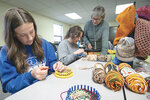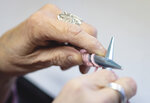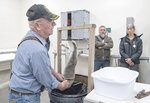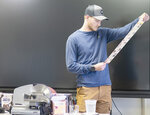Mostly Cloudy, 51° F
As students drifted into the Northwest College Paul Stock Agricultural Pavilion industrial kitchen Friday to learn to process livestock, Marvin Mauch didn’t mince words. Three live rabbits and …
This item is available in full to subscribers.
The Powell Tribune has expanded its online content. To continue reading, you will need to either log in to your subscriber account, or purchase a subscription.
If you are a current print subscriber, you can set up a free web account by clicking here.
If you already have a web account, but need to reset it, you can do so by clicking here.
If you would like to purchase a subscription click here.
Please log in to continue |
|




As students drifted into the Northwest College Paul Stock Agricultural Pavilion industrial kitchen Friday to learn to process livestock, Marvin Mauch didn’t mince words. Three live rabbits and three fat roosters were separated in pet carriers nearby. Without warning, Mauch gently gathered up a fluffy rabbit and humanely dispatched it with a twist of its neck, detailing his motions as he proceeded.
Classmates, who were cheerfully chatting just prior to their first of several somewhat sobering lessons, stood silently, intently watching as Mauch quickly stripped the skin off the meaty hare.
Just moments before the class started, Heather Rhodes Tisdale’s daughter Hayley Rhodes was holding the docile rabbit in her arms and pleading with her mother to spare the rabbit.
“This one is nice,” she whined, knowing her pleas were in vain.
Being self-sufficient requires some hard lessons and this was one of those days. However, the next day Hayley was enrolled in a class for sheep shearing. Life goes on.
Co-instructor of the class in the new Homestead Series, Tisdale found herself alone with her five children after her husband Dustin Rhodes died due to complications from COVID-19 in November of 2021. She knew providing meat would be expensive for her large family, so she began raising her own — eliminating the middleman by harvesting her livestock. At times the rabbits have become temporary pets for her children prior to harvesting.
Clark residents Andrea and Kirk Hanning have never harvested their own meat, but were eager to learn as the couple looks forward to retirement.
“We are looking to [obtain meat] more affordably, more self-sufficiently and honestly,” Andrea said. “It’s never a bad idea to learn as much as you can.”
Tisdale said a big part of the interest in home-grown meat is price and origins.
“It’s just it’s too expensive to buy it. And I want to know where my meats come from,” she said. “I want to know what’s in it, what it was fed and what kind of medications, if any, are put into it.”
She also wants to be prepared. Losing her first husband was eye opening and she wants to be ready should a future emergency once again force isolation like in 2020.
“If we ever have another COVID-type crisis again, I’ll have full freezers.”
Harvesting meat wasn’t the only class on the schedule on Arbor Day weekend. A group of instructors and skilled volunteers came together to teach skills often lost as generations get further from “simpler times” when every home was self sufficient.
While Tisdale and Mauch taught the art of butchering, other instructors were teaching sheep shearing, knitting and more. There were a dozen subjects, all a part of the Homestead Series, a new educational series of workshops promoting self-sufficiency skills.
Powell’s Christy Muecke and Northwest College’s Christi Greaham saw a need for classes in traditional skills and crafts, including some of the talents in their own skill sets, like beekeeping and soap making.
“We always have people asking us how do you do that?” Greaham said, referring to skills she has retained through the years. “You know, little things that we just do all the time.”
Muecke and her husband Ryan are keen to retain multiple skills being lost in the 21st Century. Her husband Ryan is a skilled butcher and the family raises livestock, hunts, has bee hives, makes their own soap and concentrates on teaching their three children to be self-sufficient.
“We were getting a lot of requests to learn some of these skills. We thought organizing classes made sence instead of having people come to our house individually,” said Muecke, who is active in 4-H and teaches at Powell Christian School.
Classes for making jerky, cheese, wine and beer, canning, using solar energy, gardening, building and herbal remedies were taught by local experts and were full Friday and Saturday. Jan Sapp, owner of Heartworks in downtown Powell, was teaching knitting to two students, Olivia and McKenzie Oilar, while other instructors helped a large group of newbies. They are much more interested in crafts like making clothing than animal husbandry.
“Seeing the projects that she’s made, it’s kind of cool,” Olivia said about Jan’s textiles while struggling with her loops on her first lesson.
Sapp said people naturally want to create things with their own hands.
“Knitting is very tactile. And most of us are very tactile people,” she said.
Sapp also raises alpacas for wool and meat and understands many aspects of being self-sufficient, though she’s not fond of the initial steps in butchering her cute domestic stock — all of which she names individually.
“Once the hide is off, I’m good because I can’t recognize who it was,” she said.
With the inaugural efforts proclaimed a success, Greaham, who directs the Center for Training and Development which offered classroom space, said they hope to do more seminars.
“With the help of some incredible instructors, we had 15 different sessions with lots of fantastic learning,” she wrote in a Facebook post after the event. “Now I am wiped out! What a great event! We will wait a week to recover, then start planning for another event in the fall.”